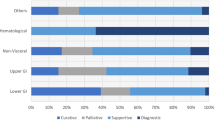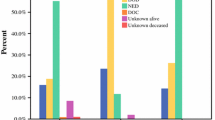Abstract
Background
Data regarding preoperative chemotherapy as a risk to surgical outcomes are limited. This study examines morbidity and mortality among patients necessitating emergent surgical procedures ≤30 days after chemotherapy.
Methods
We identified patients ≥18 years that received chemotherapy ≤30 days before emergency surgery (Chemo) in ACS NSQIP, 2005–2008. Subjects were compared with a control group who underwent similar emergent procedures (matched 1:1 on age and procedure/CPT code). Primary outcomes included 30-day postoperative morbidity and mortality. Log-transformed data, bivariate and multivariate linear and conditional logistic regression were used.
Results
A total of 1912 patients were identified (956/group). Patient demographics were similar. The Chemo group had lower BMI (26.3 vs 28.3, P < .001) and more frequent preoperative lab abnormalities. The number of days from admission to operation was greater in the chemo group (3.6 vs 2.6, P < .001). There was no difference in total operative time, days from operation to death, and total length of inpatient stay. Chemo patients were more likely to receive intraoperative transfusions (26.8 vs 18.7, P < .001; odds ratio [OR]: 1.59). Postoperatively, chemo patients had more major complications (44.0% vs 39.2%, P = .033; OR: 1.2), a greater risk of having ≥1 complication (45.0% vs 40.5%, P = .047; OR: 1.2), and higher mortality (22.4% vs 10.3%, P < .001; OR: 2.53). Multivariate analysis identified 3 variables predictive of mortality (chemotherapy, dyspnea, leukopenia), and 2 associated with a major complication (COPD, prolonged PTT).
Conclusions
Patients having emergent surgery after chemotherapy have more comorbidities and severe disease, which are associated with higher complication rates and mortality. Identifying modifiable parameters prior to surgery may improve postoperative outcomes.

Similar content being viewed by others
References
Spira A, Ettinger DS. Multidisciplinary management of lung cancer. N Engl J Med. 2004;350:379–92.
Chang JH, Vines E, Bertsch H, Fraker DL, Czerniecki BJ, Rosato EF, et al. The impact of a multidisciplinary breast cancer center on recommendations for patient management: the University of Pennsylvania experience. Cancer. 2001;91:1231–7.
Fisher B, Bryant J, Wolmark N, Mamounas E, Brown A, Fisher ER, et al. Effect of preoperative chemotherapy on the outcome of women with operable breast cancer. J Clin Oncol. 1998;16:2672–85.
Igaki H, Kato H, Ando N, Shinoda M, Shimizu H, Nakamura T, et al. A randomized trial of postoperative adjuvant chemotherapy with cisplatin and 5-fluorouracil versus neoadjuvant chemotherapy for clinical stage II/III squamous cell carcinoma of the thoracic esophagus (JCOG9907) (abstract). J Clin Oncol. 26(Suppl):4510.
Gebski V, Burmeister B, Smithers BM, Foo K, Zalcberg J, Simes J. Survival benefits from neoadjuvant chemoradiotherapy or chemotherapy in oesophageal carcinoma: a meta-analysis. Lancet Oncol. 2007;8:226–34.
Sauer R, Becker H, Hohenberger W, Rödel C, Wittekind C, Fietkau R, et al. Preoperative versus postoperative chemoradiotherapy for rectal cancer. N Engl J Med. 2004;351:1731–40.
Advanced Bladder Cancer Meta-analysis Collaboration. Neoadjuvant chemotherapy for invasive bladder cancer. Cochrane Database Syst Rev. 2004;(1):CD005246. doi:10.1002/14651858.CD005246.
Daniel D, Crawford J. Myelotoxicity from chemotherapy. Semin Oncol. 2006;33:74–85.
Siegenthaler MP, Pisters KM, Merriman KW, Roth JA, Swisher SG, Walsh GL, et al. Preoperative chemotherapy for lung cancer does not increase surgical morbidity. Ann Thorac Surg. 2001;71:1105–11; discussion 1111–2.
Meric F, Milas M, Hunt KK, Hess KR, Pisters PW, Hildebrandt G, et al. Impact of neoadjuvant chemotherapy on postoperative morbidity in soft tissue sarcomas. J Clin Oncol. 2000;18:3378–83.
Nordlinger B, Sorbye H, Glimelius B, Poston GJ, Schlag PM, Rougier P, et al. Perioperative chemotherapy with FOLFOX4 and surgery versus surgery alone for resectable liver metastases from colorectal cancer (EORTC Intergroup trial 40983): a randomised controlled trial. Lancet. 2008;371:1007–16.
Scoggins CR, Campbell ML, Landry CS, Slomiany BA, Woodall CE, McMasters KM, et al. Preoperative chemotherapy does not increase morbidity or mortality of hepatic resection for colorectal cancer metastases. Ann Surg Oncol. 2009;16:35–41.
Welsh FK, Tilney HS, Tekkis PP, John TG, Rees M. Safe liver resection following chemotherapy for colorectal metastases is a matter of timing. Br J Cancer. 2007;96:1037–42.
Brouquet A, Benoist S, Julie C, Penna C, Beauchet A, Rougier P, et al. Risk factors for chemotherapy-associated liver injuries: A multivariate analysis of a group of 146 patients with colorectal metastases. Surgery. 2009;145:362–71.
Fahy BN, Aloia TA, Jones SL, Bass BL, Fischer CP. Chemotherapy within 30 days prior to liver resection does not increase postoperative morbidity or mortality. HPB (Oxford). 2009;11:645–55.
Habr-Gama A, Perez RO, Proscurshim I, Nunes Dos Santos RM, Kiss D, Gama-Rodrigues J, et al. Interval between surgery and neoadjuvant chemoradiation therapy for distal rectal cancer: does delayed surgery have an impact on outcome? Int J Radiat Oncol Biol Phys. 2008;71:1181–8.
Tulchinsky H, Shmueli E, Figer A, Klausner JM, Rabau M. An interval >7 weeks between neoadjuvant therapy and surgery improves pathologic complete response and disease-free survival in patients with locally advanced rectal cancer. Ann Surg Oncol. 2008;15:2661–7.
Lim SB, Choi HS, Jeong SY, Kim DY, Jung KH, Hong YS, et al. Optimal surgery time after preoperative chemoradiotherapy for locally advanced rectal cancers. Ann Surg. 2008;248:243–51.
Stein DE, Mahmoud NN, Anne PR, Rose DG, Isenberg GA, Goldstein SD, et al. Longer time interval between completion of neoadjuvant chemoradiation and surgical resection does not improve downstaging of rectal carcinoma. Dis Colon Rectum. 2003;46:448–53.
Ferrara JJ, Martin EW, Jr., Carey LC. Morbidity of emergency operations in patients with metastatic cancer receiving chemotherapy. Surgery. 1982;92:605–9.
Hawkins JA, Mower WR, Nelson EW. Acute abdominal conditions in patients with leukemia. Am J Surg. 1985;150:739–42.
Koretz MJ, Neifeld JP. Emergency surgical treatment for patients with acute leukemia. Surg Gynecol Obstet. 1985;161:149–51.
Khuri SF, Daley J, Henderson W, Barbour G, Lowry P, Irvin G, et al. The National Veterans Administration Surgical Risk Study: risk adjustment for the comparative assessment of the quality of surgical care. J Am Coll Surg. 1995;180:519–31.
Khuri SF, Daley J, Henderson W, Hur K, Demakis J, Aust JB, et al. The Department of Veterans Affairs’ NSQIP: the first national, validated, outcome-based, risk-adjusted, and peer-controlled program for the measurement and enhancement of the quality of surgical care. National VA Surgical Quality Improvement Program. Ann Surg. 1998;228:491–507.
ACS-NSQIP participant use file user’s guide. http://acsnsqip.org/puf/docs/ACS_NSQIP_Participant_User_Data_File_User_Guide.pdf. Accessed 1 Oct 2010.
ACS NSQIP program specifics: surgical case inclusion/exclusion overview. http://acsnsqip.org/main/program_case_inclusion_exclusion.asp. Accessed 1 Oct 2010.
Kratz A, Ferraro M, Sluss PM, Lewandrowski KB. Case records of the Massachusetts General Hospital. Weekly clinicopathological exercises. Laboratory reference values. N Engl J Med. 2004;351:1548–63.
Borja-Cacho D, Parsons HM, Habermann EB, Rothenberger DA, Henderson WG, Al-Refaie WB. Assessment of ACS NSQIP’s predictive ability for adverse events after major cancer surgery. Ann Surg Oncol. 2010;17:2274–82.
Breslow N. Design and analysis of case-control studies. Annu Rev Public Health. 1982;3:29–54.
Nagelkerke NJ, Moses S, Plummer FA, Brunham RC, Fish D. Logistic regression in case-control studies: the effect of using independent as dependent variables. Stat Med. 1995;14:769–75.
Ingraham AM, Cohen ME, Bilimoria KY, Feinglass JM, Richards KE, Hall BL, et al. Comparison of hospital performance in nonemergency versus emergency colorectal operations at 142 hospitals. J Am Coll Surg. 2010;210:155–65.
Ingraham AM, Cohen ME, Bilimoria KY, Raval MV, Ko CY, Nathens AB, et al. Comparison of 30-day outcomes after emergency general surgery procedures: potential for targeted improvement. Surgery. 2010;148:217–38.
Dhungel B, Diggs BS, Hunter JG, Sheppard BC, Vetto JT, Dolan JP. Patient and peri-operative predictors of morbidity and mortality after esophagectomy: American College of Surgeons National Surgical Quality Improvement Program (ACS-NSQIP), 2005-2008. J Gastrointest Surg. 2010;14:1492–501.
Reim D, Huser N, Humberg D, Novotny A, Assfalg V, Matevossian E, et al. Preoperative clinically inapparent leucopenia in patients undergoing neoadjuvant chemotherapy for locally advanced gastric cancer is not a risk factor for surgical or general postoperative complications. J Surg Oncol. 2010;102:321–4.
Greenblatt DY, Kelly KJ, Rajamanickam V, Wan Y, Hanson T, Rettammel R, et al. Preoperative factors predict perioperative morbidity and mortality after pancreaticoduodenectomy. Ann Surg Oncol. 2011. Feb 20. [Epub ahead of print].
Pereira ED, Fernandes AL, da Silva Ancao M, de Arauja Pereres C, Atallah AN, Faresin SM. Prospective assessment of the risk of postoperative pulmonary complications in patients submitted to upper abdominal surgery. Sao Paulo Med J. 1999;117:151–60.
Shiloach M, Frencher SK, Jr., Steeger JE, Rowell KS, Bartzokis K, Tomeh MG, et al. Toward robust information: data quality and inter-rater reliability in the American College of Surgeons National Surgical Quality Improvement Program. J Am Coll Surg. 2010;210:6–16.
Itani KM. Fifteen years of the National Surgical Quality Improvement Program in review. Am J Surg. 2009;198:S9–18.
Khuri SF, Henderson WG, Daley J, Jonasson O, Jones RS, Campbell DA Jr, et al. Successful implementation of the Department of Veterans Affairs’ National Surgical Quality Improvement Program in the private sector: the Patient Safety in Surgery study. Ann Surg. 2008;248:329–36.
Rowell KS, Turrentine FE, Hutter MM, Khuri SF, Henderson WG. Use of national surgical quality improvement program data as a catalyst for quality improvement. J Am Coll Surg. 2007;204:1293–300.
Birkmeyer JD, Shahian DM, Dimick JB, Finlayson SR, Flum DR, Ko CY, et al. Blueprint for a new American College of Surgeons: National Surgical Quality Improvement Program. J Am Coll Surg. 2008;207:777–82.
Conflicts of interest
None.
Author information
Authors and Affiliations
Corresponding author
Rights and permissions
About this article
Cite this article
Sullivan, M.C., Roman, S.A. & Sosa, J.A. Does Chemotherapy Prior to Emergency Surgery Affect Patient Outcomes? Examination of 1912 Patients. Ann Surg Oncol 19, 11–18 (2012). https://doi.org/10.1245/s10434-011-1844-7
Received:
Published:
Issue Date:
DOI: https://doi.org/10.1245/s10434-011-1844-7




